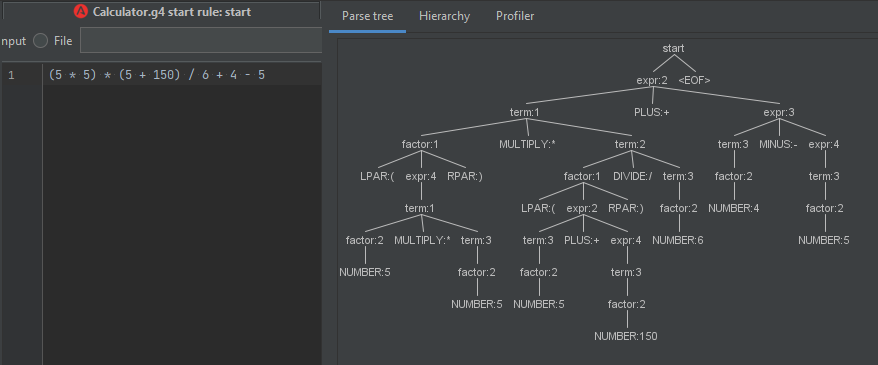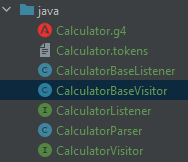Build Interpreters with ANTLR4 and GPT
ANTLR4 is a fantastic tool to build interpreters. It is a parser generator that can generate parsers in many languages. I use it a lot to build (silly) interpreters for my own languages like image manipulation language in SQL: PicSQL.
In this article, how to connect LLM like GPT to ANTLR4 to build grammars and interpreters… in natural language!
Code
Here we go…
@OptIn(BetaOpenAI::class)
suspend fun buildInterpreter(prompt: String, grammarFile: String) {
val chatCompletionRequest = ChatCompletionRequest(
model = ModelId("gpt-4"),
messages = listOf(
ChatMessage(
ChatRole("user"),
"""
Build a valid non-recursive ANTLR4 g4 grammar named $grammarFile
given the description of the language "$prompt".
Don't build a grammar with rules that are mutually left-recursive.
Be sure to add labels and well defined rules.
Only print the grammar, without any extra stuff.
"""
)
)
)
val openAI = OpenAI(token = "YOUR_TOKEN", timeout = Timeout(socket = 20.minutes))
val completion: ChatCompletion = openAI.chatCompletion(chatCompletionRequest)
val answer = completion.choices.joinToString("") {
it.message!!.content!!
}
val grammarParsed = extractAntlrGrammar(answer)
File(grammarFile).writeText(grammarParsed)
val grammar = Grammar(File(grammarFile).readText())
grammar.name = grammarFile.substringBefore(".g4")
grammar.tool.gen_visitor = true
grammar.tool.gen_listener = true
CodeGenPipeline(grammar).process()
}
fun extractAntlrGrammar(text: String): String {
val grammar = "```antlr([\\s\\S]*?)```".toRegex().find(text)
if (grammar != null) {
return grammar.groupValues[1]
}
return text
}If the first part of the code, we prompt GPT with a description of the language we want to parse. It’s important to give him the grammar file name, because it will be used to name the grammar and it necessary to have a valid ANTLR4 grammar that can be compiled later.
Then, we extract the grammar from the answer of GPT. We use a regex to extract the grammar from the answer because sometimes GPT return extra stuff that we don’t want despite the fact that we ask him to only return the grammar…
Finally, we build the grammar with ANTLR4 toolkit and we generate the visitor and listener.
val grammar = Grammar(File(grammarFile).readText())
grammar.name = grammarFile.substringBefore(".g4")
grammar.tool.gen_visitor = true
grammar.tool.gen_listener = true
CodeGenPipeline(grammar).process()That will generate Java classes for the visitor and listener (see Examples) that can be used in your projects !
So you need to add the ANTLR4 dependency to your project:
implementation("org.antlr:antlr4:4.9.3")Examples
First, I build a grammar for a simple calculator:
suspend fun main(){
buildInterpreter("a simple calculator", "Calculator.g4")
}The generated grammar is:
grammar Calculator;
// Parser Rules
start: expr EOF;
expr
: MINUS term
| term PLUS expr
| term MINUS expr
| term
;
term
: factor MULTIPLY term
| factor DIVIDE term
| factor
;
factor
: LPAR expr RPAR
| NUMBER
;
// Lexer Rules
MINUS : '-';
PLUS : '+';
MULTIPLY : '*';
DIVIDE : '/';
LPAR : '(';
RPAR : ')';
NUMBER : [0-9]+ ('.' [0-9]+)?;
WS : [ \t\n\r]+ -> skip ; // Skip spaces, tabs, line breaksThe grammar works !

ANTLR4 build visitors and listeners in Java like you can see:

The base visitor is:
public class CalculatorBaseVisitor<T> extends org.antlr.v4.runtime.tree.AbstractParseTreeVisitor<T> implements CalculatorVisitor<T> {
/**
* {@inheritDoc}
*
* <p>The default implementation returns the result of calling
* {@link #visitChildren} on {@code ctx}.</p>
*/
@Override public T visitStartRule(CalculatorParser.StartRuleContext ctx) { return visitChildren(ctx); }
/**
* {@inheritDoc}
*
* <p>The default implementation returns the result of calling
* {@link #visitChildren} on {@code ctx}.</p>
*/
@Override public T visitExpression(CalculatorParser.ExpressionContext ctx) { return visitChildren(ctx); }
/**
* {@inheritDoc}
*
* <p>The default implementation returns the result of calling
* {@link #visitChildren} on {@code ctx}.</p>
*/
@Override public T visitSub_exp(CalculatorParser.Sub_expContext ctx) { return visitChildren(ctx); }
/**
* {@inheritDoc}
*
* <p>The default implementation returns the result of calling
* {@link #visitChildren} on {@code ctx}.</p>
*/
@Override public T visitMult_exp(CalculatorParser.Mult_expContext ctx) { return visitChildren(ctx); }
/**
* {@inheritDoc}
*
* <p>The default implementation returns the result of calling
* {@link #visitChildren} on {@code ctx}.</p>
*/
@Override public T visitPow_exp(CalculatorParser.Pow_expContext ctx) { return visitChildren(ctx); }
/**
* {@inheritDoc}
*
* <p>The default implementation returns the result of calling
* {@link #visitChildren} on {@code ctx}.</p>
*/
@Override public T visitDiv_exp(CalculatorParser.Div_expContext ctx) { return visitChildren(ctx); }
/**
* {@inheritDoc}
*
* <p>The default implementation returns the result of calling
* {@link #visitChildren} on {@code ctx}.</p>
*/
@Override public T visitAtom(CalculatorParser.AtomContext ctx) { return visitChildren(ctx); }
}Go Further
A lot to do here !
Some ideas:
- Fix grammar errors
- Generate the code of the visitor and listener in Kotlin
- Expand the grammar with more rules